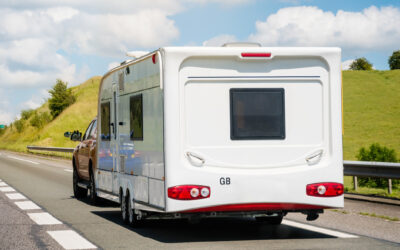Agreed Value v Market Value: Which one for your touring caravan insurance?
When you take out an insurance policy on a touring caravan, you might find you can choose between insuring it for the agreed value or the market value. But what’s the difference? And does it really matter which one you choose?
Wrapper takes a look at the pros and cons of agreed value and market value cover, so you’re armed with all the information you need to choose the right protection for the adventures you love…
What are ‘market value’ and ‘agreed value’?
Market value is when your insurer determines the value of your caravan on the basis of what it would sell for in the current market, taking into account things like age, mileage and wear and tear.
Agreed value is when you and your insurer agree a fixed amount that your vehicle is worth, guaranteeing the value of your claim for the duration of the policy. You’ll need to prove the value before your insurer will agree it, for example through photographs and proof of an independent valuation.
The pros and cons of market value
What are the benefits of market value?
Most insurance policies are designed to pay out on the basis of market value. It’s an easy-to-implement measure of how much your insurer should be paying out in the event your motorhome or caravan is stolen or written off, in that it determines value based on what’s happening in the market. What a similar vehicle would sell for at that moment in time is what your insurer would pay out.
The benefit of this is that you should always be able to replace your motorhome or caravan with a similar one – something of the same age and mileage, with comparable signs of wear and tear.
Another benefit of market value is that it’s the standard for most insurance companies, so policies of this type are easy to come by and generally better priced.
What are the drawbacks of market value?
One of the drawbacks of market value cover is that, generally speaking, a caravan will depreciate in value over time, so your claim will become less and less as the years go by. Basically, you’re unlikely to ever recover the amount it cost you to buy in the first place. Of course, when the market is buoyant, as it is now, the value of your claim goes up. The demand for second-hand caravans has skyrocketed over recent years, to the point that supply can barely keep up with demand. Consequently, the value of second-hand ones has gone up, and market value for insurance purposes has risen along with it.
The pros and cons of agreed value
What are the benefits of agreed value?
The main benefit of agreed value is that, because you and your insurer agree a set value for your caravan, you always know what your payout will be if disaster were to strike during the policy term. In the event of a total loss of your vehicle, you know exactly how much you’re getting, and how much you can afford to spend on a replacement.
Agreed value works particularly well for things like classic cars or campervans, where age and mileage are higher, but the value is a bit more subjective. You might, for example, know that even though you’ve got a 50-year-old campervan with a temperamental starter motor, there is a group of committed enthusiasts who would gladly pay a lot of money to buy it off you. In that respect, agreed value ensures you a payout that takes subjectivity into account.
What are the drawbacks of agreed value?
One of the biggest downsides of agreed value is the availability of the product – simply not all insurance companies offer it as an option. That means you may end up having to find a specialist insurer to provide cover for your motorhome, campervan or caravan, and that will often mean it’s more expensive.
There may also be certain restrictions placed on your use of the vehicle in question, such as how often you use it, where you are able to take it, and even how many miles you are permitted to do under the terms of the policy. A lot of insurers that offer agreed value cover restrict annual mileage to between 3,000 and 5,000 miles, and that might not be enough to let you get out and do all the adventuring you want to do.
Agreed Value or Market Value: Which one is right for you?
You’ll want to spend a bit of time weighing up the pros and cons before deciding if you’re happy with a market value policy, or if you want to find an insurer that will cover you for an agreed value.
The crux of the decision essentially comes down to whether or not you are happy to put the value of your claim in the hands of the market. As we mentioned above, the market is currently really strong for leisure and lifestyle vehicles like motorhomes, caravans and campervans, so it’s a good time to get your cover working hard for you.
Looking for cover?
Wrapper is a specialist lifestyle and leisure vehicle insurer, committed to ensuring you’ve always got the cover you need. That’s why we always put you in the driving seat, letting you design, buy and manage your own policy, 100% online, 100% of the time. For on-demand protection for the lifestyle you love, get a quote today. We offer agreed value and market value rates for touring caravans.
Recent Posts
- Pop the Champagne! Wrapper Insure wins at Insurance Times awards December 17, 2022
- On the road again: Preparing your motorhome or caravan for the season ahead December 2, 2022
- 5 things to do if your motorhome or caravan is stolen November 14, 2022





